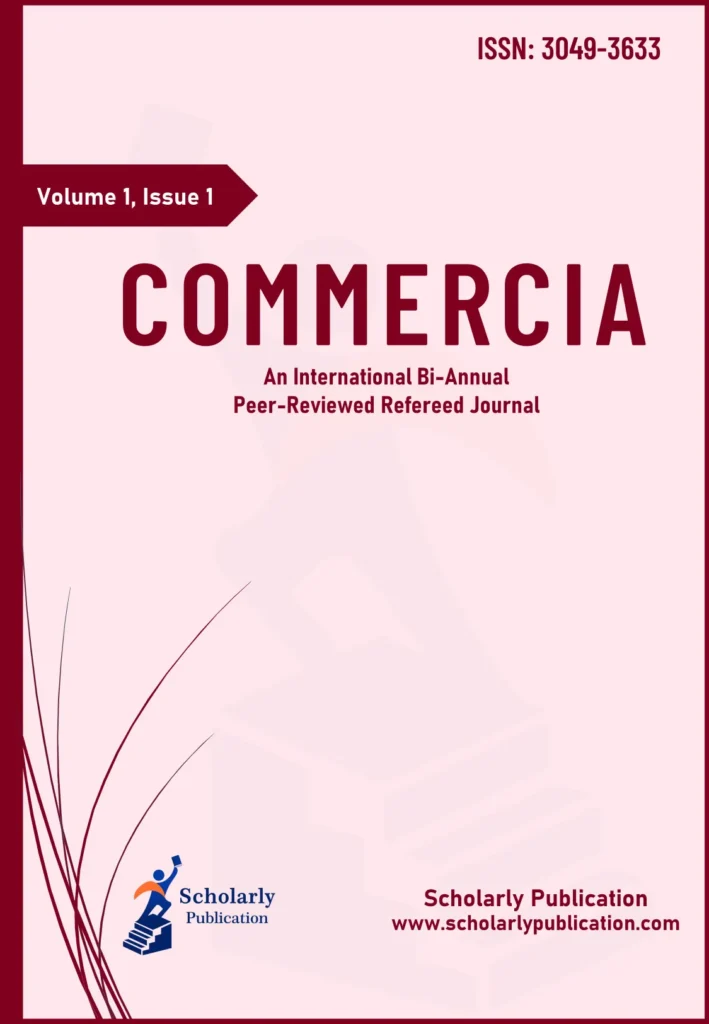Impact of HRM Practices on Organizational Sustainability
Volume 1, Issue 1, Article Number: 251002 (2025)
Home >> Commercia >> Volume 1, Issue 1
1Research Scholar, School of Commerce and Management, Nirwan University Jaipur, Rajasthan – 303305 (India)
*Corresponding Author: alp_alka@yahoo.co.in
Received: 13 December 2024 | Revised: 26 December 2024
Accepted: 27 December 2024 | Published Online: 15 January 2025
DOI: https://doi.org/10.5281/zenodo.15108414
© 2025 The Authors, under a Creative Commons license, Published by Scholarly Publication
Abstract
The cornerstones of enhanced performance and sustained competitive advantage are material assets, human capital, and organizational resources. Businesses can achieve sustainability goals and differentiate themselves from the competition by integrating green initiatives with human resources management (HRM) strategies. This study examines the effects of a number of HRM practices on an organization’s long-term sustainability, including hiring, training and development, management of performance, employee engagement initiatives, and green HRM policies. The study looks into how these practices affect sustainability outcomes including improved company reputation, increased employee retention rates, and less of an influence on the environment. This Study has used quantitative data from a thorough review of peer-reviewed journals, including Wiley Online Library, ScienceDirect, Emerald, and Sage Publications. The findings demonstrate the importance of sustainable HRM practices in developing an employer brand that appeals to both current and prospective employees while maintaining a consistent corporate image. By identifying gaps in the literature, this study provides useful insights and a research roadmap for future investigations into the dynamic interaction between HRM practices and organizational sustainability.
Keywords
HRM practices, organizational sustainability, environmental sustainability, sustainability
References
- Amjad, F., Abbas, W., Zia-Ur-Rehman, M., Baig, S. A., Hashim, M., Khan, A., & Rehman, H. U. (2021). Effect of green human resource management practices on organizational sustainability: the mediating role of environmental and employee performance. Environmental Science and Pollution Research, 28, 28191-28206.
[View Article] [Google Scholar]
- Baron, R. M., & Kenny, D. A. (1986). The moderator–mediator variable distinction in social psychological research: Conceptual, strategic, and statistical considerations. Journal of Personality and Social Psychology, 51, 1173.
[View Article] [Google Scholar]
- Buller, P. F., & McEvoy, G. M. (2016). A model for implementing a sustainability strategy through HRM practices. Business and Society Review, 121, 465-495.
[View Article] [Google Scholar]
- Campos‐García, I., Alonso‐Muñoz, S., González‐Sánchez, R., & Medina‐Salgado, M. S. (2024). Human resource management and sustainability: Bridging the 2030 agenda. Corporate Social Responsibility and Environmental Management, 31, 2033-2053.
[View Article] [Google Scholar]
- Celestin, M., & Sujatha, S. (2024). Integrating ESG Factors Into Core Operations: Long Term Benefits for Business Growth and Reputation. International Journal of Advanced Trends in Engineering and Technology, 9, 33-43.
[View Article] [Google Scholar]
- Chaudhari, C., Nakhate, D. V., & Rautrao, M. R. R. (2020). Role of HR trends in corona-crisis management and organizational sustainability readiness. J. Adv. Sci. Technol, 29, 2278-2286.
[View Article] [Google Scholar]
- Colbert, B. A., & Kurucz, E. C. (2007). Three conceptions of triple bottom line business sustainability and the role for HRM. Human Resource Planning, 30, 21.
- Das, S. C., & Singh, R. K. (2016). Green HRM and organizational sustainability: An empirical review. Kegees Journal of Social Science, 8, 227-236.
- Dwivedi, P., Chaturvedi, V., & Vashist, J. K. (2021). Innovation for organizational sustainability: the role of HR practices and theories. International Journal of Organizational Analysis, 31, 759-776.
[View Article] [Google Scholar]
- Ehnert, I., Harry, W., & Zink, K. J. (2013). Sustainability and HRM: An introduction to the field. In: Ehnert, I., Harry, W., Zink, K. (eds) Sustainability and Human Resource Management: Developing Sustainable Business Organizations. Springer Berlin Heidelberg, 3-32.
[View Chapter] [Google Scholar]
- Fapohunda, T. M., Genty, K. I., & Olanlpekun, L. O. (2022). The Effect of Green Recruitment and Selection Practices on Organizational Sustainability Among Selected Manufacturing Firms in Ogun State, Nigeria. Texas Journal of Multidisciplinary Studies, 4, 174-186.
[View Article] [Google Scholar]
- Guerci, M., Radaelli, G., Siletti, E., Cirella, S., & Rami Shani, A. B. (2015). The impact of human resource management practices and corporate sustainability on organizational ethical climates: An employee perspective. Journal of Business Ethics, 126, 325-342.
[View Article] [Google Scholar]
- Iannuzzi, A. (2024). Greener products: The making and marketing of sustainable brands. CRC press.
[View Article] [Google Scholar]
- Jam, M., & Jamal, W. N. (2020). Impact of Green Human Resources Management Practices on Organizational Sustainability and Employee Retention: An Empirical Study Related to Educational Institutions. iRASD Journal of Management, 2, 38-48.
[View Article] [Google Scholar]
- Likhitkar, P., & Verma, P. (2017). Impact of green HRM practices on organization sustainability and employee retention. International Journal for Innovative Research in Multidisciplinary Field, 3, 152-157.
- Malik, S. Y., Cao, Y., Mughal, Y. H., Kundi, G. M., Mughal, M. H., & Ramayah, T. (2020). Pathways towards sustainability in organizations: Empirical evidence on the role of green human resource management practices and green intellectual capital. Sustainability, 12, 3228.
[View Article] [Google Scholar]
- Miah, M., Szabó-Szentgróti, G., & Walter, V. (2024). A systematic literature review on green human resource management (GHRM): an organizational sustainability perspective. Cogent Business & Management, 11, 2371983.
[View Article] [Google Scholar]
- Mujtaba, M., & Mubarik, M. S. (2021). Talent management and organizational sustainability: role of sustainable behaviour. International Journal of Organizational Analysis, 30, 389-407.
[View Article] [Google Scholar]
- Oswal, N., & Narayanappa, G. L. (2015). Evolution of HRM to E-HRM to achieve organizational effectiveness and sustainability. International Journal of Business Administration and Management Research, 1, 22-26.
- Rasool, S. F., Samma, M., Wang, M., Zhao, Y., & Zhang, Y. (2019). How human resource management practices translate into sustainable organizational performance: the mediating role of product, process and knowledge innovation. Psychology Research and Behavior Management, 12, 1009.
[View Article] [Google Scholar]
- Tekwani, K., Rana, A., & Raghuvanshi, R. (2021). Impact of GST On Handicraft Exporters. Economic Studies, 30, 156-173.
[View Article] [Google Scholar]
- Tursunov, B. O., Kulueva, C. R., Abdurakhmanov, O. K., Shabaltina, L. V., & Bezdenezhnykh, T. I. (2024). Managing Financial Risks of Global Companies Through Corporate Social Responsibility: The Specifics of Sustainable Employment in Developed and Developing Countries. Risks, 12, 168.
[View Article] [Google Scholar]
- Ullah, M. M. (2017). Integrating environmental sustainability into human resources management: A comprehensive review on green human resources management (Green HRM) Practices. Economics and Management, 6, 14-19.
[View Article] [Google Scholar]
- Yakymchuk, A., & Rataj, M. (2024). Development of the green policy strategies of enterprises: а decent work. Economics and Environment, 89, 752-752.
Cite This Article
A. Tiwari, “Impact of HRM Practices on Organizational Sustainability,” Commercia 1(1) (2025) 251002. https://doi.org/10.5281/zenodo.15108414
Rights & Permission
This is an open access article published under the Creative Commons Attribution (CC BY) International License, which allows unrestricted use, distribution, and reproduction in any medium, provided the original work is properly cited. No permission is needed to reuse this content under the terms of the license.
For uses not covered above, please contact the Scholarly Publication Rights Department.

